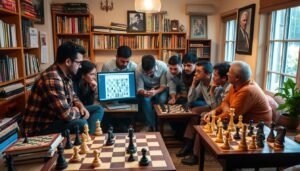This guide is your roadmap to better chess skills. It focuses on learning and strategy to help you grow. To improve, you need a plan that covers all parts of the game. With the right strategies, your chess game will get much better.
Improving in chess is more than just remembering moves. It’s about understanding strategy and tactics. As you learn more, you’ll find chess both fun and challenging. This will help you become a better player and keep you interested in chess for life.
Understanding the Basics of Chess
Every chess player needs to know the game’s basics. Knowing these basics is key for skill improvement. Chess strategy tips often stress the importance of these fundamentals. This section will cover important chess terms and basic rules and movements.
Importance of Chess Fundamentals
Mastering the basics is the foundation of chess skill. A solid grasp of basic principles helps navigate complex strategies. Without these basics, improving chess can be confusing and frustrating.
Understanding these fundamentals ensures smooth progress to more advanced tactics and strategies.
Common Chess Terminology
Knowing common chess terms helps in the chess community. Some key terms include:
- Check: A situation where a king is under direct threat.
- Checkmate: The end of the game, where a king cannot escape capture.
- Draw: A situation where neither player can win, resulting in a tie.
- Pawn Promotion: The conversion of a pawn to a higher piece upon reaching the opponent’s back rank.
Basic Rules and Movements
Knowing the basic rules and movements of chess pieces is crucial. Here are some key rules to remember:
- Each player starts with 16 pieces: one king, one queen, two rooks, two knights, two bishops, and eight pawns.
- The goal is to checkmate the opponent’s king while protecting your own.
- Each type of piece moves differently. For instance:
- Kings move one square in any direction.
- Queens move any number of squares in any direction.
- Knights move in an “L” shape, jumping over other pieces.
Practicing these fundamentals is helpful for improving chess skills. Knowing the basic rules and movements is a solid foundation. It allows players to move on to more complex strategies and tactics.
Establishing a Strong Opening Strategy
An effective opening strategy is key for chess players looking to get better. Learning popular openings is a solid start. Mastering these can greatly boost your game.
Popular Opening Strategies
Many opening strategies are crucial for winning games. Here are three important ones:
- Sicilian Defense: This opening leads to complex, tactical battles.
- Ruy Lopez: A classic choice that focuses on solid development and position.
- French Defense: A strong strategy that allows for counter-attacks.
Importance of Opening Theory
Opening theory is more than just memorizing moves. It’s about understanding the game’s core principles. Players who get this can make smart moves early on.
Knowing opening strategies is key. It lets players use advanced tactics and get an early advantage.
Tips for Memorizing Openings
To learn openings, try these methods:
- Practice by studying them over and over.
- Use visual aids or opening trees to help remember.
- Play mock games focusing on specific openings.
Using these techniques can make your chosen openings second nature. This boosts your confidence in games.
Developing Tactics and Combinations
Chess mastery starts with a solid grasp of tactics and combinations. Knowing how to spot and use tactical patterns is key. With regular practice, players can boost their chess skills.
Recognizing Tactical Patterns
Being aware of common tactical patterns can change a player’s game. It’s crucial to know about forks, pins, and skewers. By practicing these, players can better predict their opponent’s moves and plan their attacks.
Essential Chess Tactics to Practice
- Forks: Use pieces to attack more than one target at once.
- Pins: Attack a less valuable piece to limit an opponent’s more valuable piece.
- Skewers: Make an opponent’s more valuable piece move, revealing a less valuable piece behind it.
Adding these tactics to your training helps improve your chess game.
Practice Exercises for Tactical Growth
Doing focused practice exercises helps sharpen your tactics. Here are some good ones:
- Finish tactical puzzles online or in chess books to spot patterns.
- Play training games with specific tactical themes to solidify your learning.
- Look over past games to find missed tactics and study different moves.
These methods create a space for improving your tactical skills. This is vital for getting better at chess.
Enhancing Calculation Skills
Calculation skills are key in chess, helping players evaluate many moves well. By getting better at this, players can make smarter choices during games. Learning to calculate different moves can boost performance.
Techniques for Calculating Variations
Good calculation techniques are essential for chess skill growth. Players use several methods to improve:
- Backward calculation: Look at key moves and trace them back to see the outcome.
- Tree analysis: Picture different paths to see all possible moves.
- Key move assessment: Identify moves that can change the game’s direction.
Importance of Visualization
Visualization is crucial for chess skill improvement. Being able to see moves ahead can greatly affect the game. Players who practice visualization make better decisions, spotting chances and dangers.
Ways to improve visualization include:
- Doing blindfold chess daily to sharpen mental images.
- Trying exercises that test spatial awareness.
Using Puzzles for Improvement
Chess puzzles are great for improving calculation and visualization. Solving puzzles regularly sharpens tactical skills and encourages deep thinking. Some useful puzzle types are:
- Checkmate puzzles that require just one or two moves.
- Position puzzles that need deep thinking.
- Endgame puzzles that test strategic planning.
The Role of Endgame Techniques
The endgame is crucial in chess. It’s where small advantages can lead to big wins. Learning key endgame techniques boosts your game. It helps you handle complex situations with ease.
Improving your chess involves several techniques. These include maximizing your king’s role, keeping pawns strong, and coordinating your pieces well.
Key Endgame Principles
There are important endgame principles to know:
- King Activity: Your king becomes very powerful in the endgame. It needs to move and support your pawns.
- Pawn Structure: Understanding pawn positions helps you see chances for creating passed pawns.
- Piece Coordination: Making sure your pieces work together increases your winning chances.
Common Endgame Scenarios
There are specific endgame situations you’ll face. Mastering these can greatly improve your game:
- King and Pawn Endings: These often decide the game’s outcome. They focus on active kings and pawn promotion.
- Rook Endings: Knowing how to handle rook endgames can put you in better positions.
Practice Endgame Techniques
Practicing is key to mastering endgame techniques. Doing drills and solving puzzles helps you understand and apply these methods. Regular practice makes these concepts second nature, helping you in real games.
Analyzing Games for Improvement
Game analysis is key for anyone wanting to get better at chess. By looking closely at games, players can spot their weak spots and find ways to get better. There are many tools out there to help with this deep dive into past games.
Utilizing Game Analysis Tools
Online platforms have advanced tools for breaking down games. These tools include:
- Automated checks of moves.
- Visual aids to show game positions.
- Advice on better moves.
Using these tools helps players see what they did right and wrong. This is vital for mastering chess.
Self-Analysis vs. Expert Analysis
Both looking at games yourself and getting help from experts are good. Self-analysis helps you understand your thought process. Expert analysis, on the other hand, can spot things you might miss. Using both ways can really help you improve at chess.
Learning from Mistakes
Making mistakes is a big part of learning in chess. Keep track of your games, marking down what went wrong and how to do better next time. A positive attitude towards mistakes helps you grow and get better. By facing these challenges, you’ll learn more about chess and aim for mastery.
Playing Regularly and Consistently
Playing chess often is key to getting better. Regular games boost your tactical skills and help you spot patterns better. You’ll feel more confident and ready to use new chess strategies in games.
Benefits of Frequent Play
Playing chess regularly has many benefits:
- Enhanced Tactical Skills: Playing often helps you see different tactics quickly.
- Improved Decision-Making: You learn to make decisions faster and better in games.
- Increased Confidence: Playing regularly lets you see many game outcomes. This boosts your confidence in chess.
Finding the Right Opponents
Finding the right opponents is important for good practice. Here are some tips:
- Join local chess clubs to play with people of all skill levels.
- Play online against players worldwide.
- Play with friends or family to learn in a relaxed setting.
Scheduling Time for Chess
Managing your time well is crucial for chess training. Make chess a regular part of your day:
- Choose specific days and times for chess.
- Try different game types, like standard, blitz, and puzzles, to keep it interesting.
- Keep a chess journal to track your progress and see how you’ve improved.
Studying Chess Literature and Resources
Exploring chess literature and online resources is key for any player. These resources offer insights for all levels, from beginners to experts. They help deepen understanding and provide practical strategies for mastering chess.
Recommended Books for All Levels
Choosing the right books can greatly improve your chess skills. Beginners should start with “Bobby Fischer Teaches Chess” and “Chess Fundamentals” by José Raúl Capablanca. These books lay a strong foundation.
Intermediate players might enjoy “My Great Predecessors” by Garry Kasparov. Advanced players can dive into “Silman’s Complete Endgame Course” or “The Life and Games of Mikhail Tal.” Each book offers valuable lessons, helping players navigate the game’s complexities.
Online Resources and Courses
The digital world has made top chess resources more accessible. Sites like Chess.com and Lichess offer interactive courses for all levels. Players can solve puzzles, take quizzes, and learn from experts.
These activities enhance understanding of key concepts. They support ongoing improvement and make learning fun.
Chess YouTube Channels to Follow
YouTube is a great place to learn chess. Channels like “The Chess Nerd,” “GothamChess,” and “agadmator’s Chess Channel” offer fun and educational content. They cover famous games, strategic analyses, and tutorials.
Following these channels makes learning chess enjoyable. It allows players to absorb valuable resources in an engaging way.
Learning from Chess Masters
Studying the games of famous chess players is very helpful. It teaches players at all levels important lessons. By looking at famous games, you can learn key strategies and tactics.
Famous Chess Games to Study
Games like the match between Bobby Fischer and Boris Spassky are great to study. They show different styles and techniques. This helps players understand the basics of chess.
Understanding Grandmaster Strategies
Looking into grandmasters’ strategies reveals deep ideas. They use their knowledge of the game to win. Learning from them helps players improve their own game.
Importance of Watching Commentary
Commentaries by chess experts are very helpful. They explain moves and decisions clearly. This helps players understand the game better and learn new tactics.
Joining a Chess Community
Being part of a chess community has many benefits. It helps players grow and get better. Talking with others motivates you to improve and learn more.
Sharing what you know and hear from others helps you understand chess better. This way, you can find more ways to get better at chess.
Benefits of Community Engagement
Chess communities are great for getting support and advice. You can share chess mastery strategies with others. This can really help you play better.
Playing with others can make you more passionate about chess. It also helps you keep getting better at the game.
Local Clubs and Online Forums
Local chess clubs and online forums are great places to meet people who love chess. You can talk about strategies, practice together, and play casual games. It’s easier to find someone to play with.
This helps you improve your chess skills. It’s a fun way to get better at the game.
Participating in Tournaments
Tournaments are a great challenge for players. They let you play against different styles. This helps you see your strengths and weaknesses.
Competing in tournaments makes you a better player. It’s a real chance to use what you’ve learned and get even better at chess.
Tracking Progress and Setting Goals
Tracking progress and setting goals are key in improving chess skills. It’s not just about winning or losing. It keeps players focused and motivated. By setting clear goals, players can see how much they’ve grown and make sure their practice is effective.
Importance of Goal Setting in Chess
Setting goals in chess helps break down big dreams into smaller steps. This makes it easier to stay on track. For example, aiming to learn three new openings or master a specific endgame can help plan practice sessions better.
Tools for Tracking Improvement
There are many tools to track chess progress. Chess databases, journals, or mobile apps can help. They let players see how they’ve improved over time. This helps spot areas to work on and supports their growth.
Adjusting Strategies Based on Performance
Regularly reviewing performance is crucial for getting better at chess. By looking at past games and learning from mistakes, players can tweak their strategies. This keeps them improving and helps them use their strengths to their advantage.




